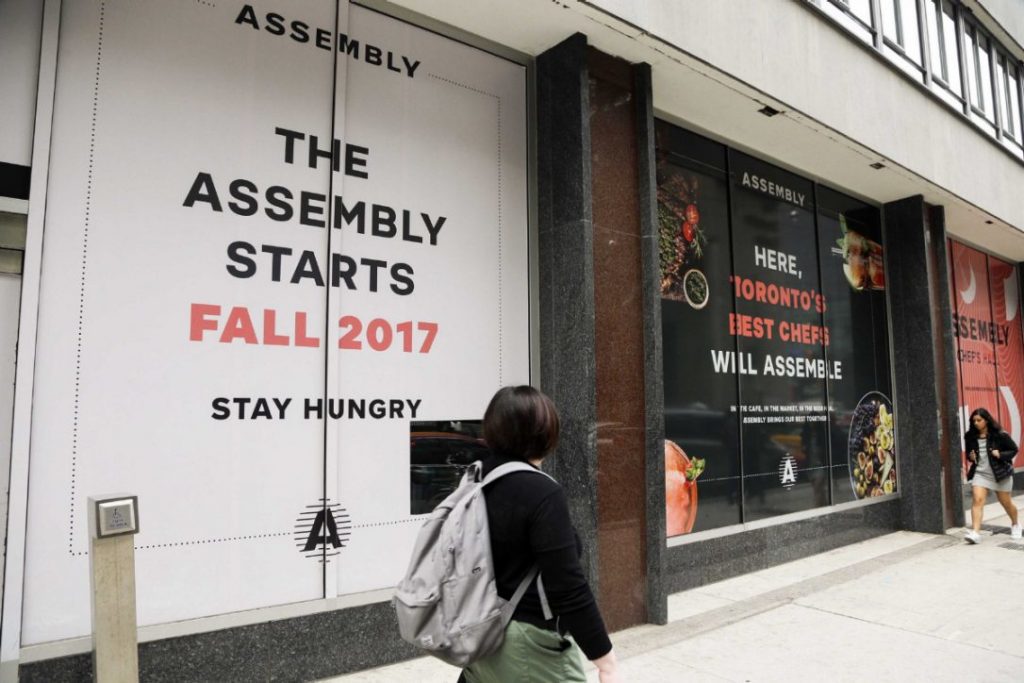By Julia Nowicki and Breanna Carter
The opening of a massive food hall in the downtown core this fall will bring quality chefs into the busy financial district and introduce multicultural cuisine to the area. It will also provide a venue for small businesses and restaurateurs to thrive in a location that is otherwise economically inaccessible.
Beacon 22, the owner of well-known Toronto restaurants Estiatorio Volos, Los Colibris and Little Anthony’s, is unveiling a new food project at 111 Richmond Street West. The 18,000 square foot food hall will house 17 restaurants and chefs from around the Greater Toronto Area. It will provide a wide range of food from lobster to Texan barbeque to traditional-style Japanese sushi bars.
Project manager and vice president of operations, Justin Cheung, said that the inspiration for the idea of an “incubator” for chefs stemmed from the lack of quality cuisine in the downtown core.
“There are a lot of great restaurants out there but the issue is that the commercial real estate in the financial district is so expensive that it has boxed-out amazing chefs, restaurateurs, and small business owners,” said Cheung.
Assembly Chef’s Hall, the food hall opening in Toronto’s financial district on Richmond Street West, aims to provide small business owners and restaurateurs a spot that would have cost millions of dollars—for a fraction of the price it would cost otherwise.
Quality food, quality location
David Naranjo is the manager of Little Anthony’s, a restaurant owned by Beacon 22 that is currently open in the area on Richmond St. W.
Naranjo said he is unafraid of the competition that Assembly will bring, but more so excited that the concept will bring more customers to the area and allow both restaurants to thrive. However, he did voice his concern that the idea of a high-end food hall may put pressure on traditional mall food courts in the area.
“It’s going to be very much high-end, quality products,” David said. “It’s going to put a lot more pressure on them to better themselves and whether or not they would want to compete for the same health-conscious customer that wants better choices and more variety.”
The concept will allow people to experience a wide range of cultural cuisine that they may not have originally been exposed to in the downtown core, said Naranjo. Naranjo added that the hall will offer a positive an inclusive atmosphere to allow for this kind of exploration.
“It has the ability to bring people from other cultures and explore something in common. It has no language,” Naranjo said. “You can appreciate food no matter where you come from, whether it is your culture or not.”
A step forward for Toronto culinary scene
Cheung emphasizes that with the opening of the Assembly Chef’s Hall, people in the area will no longer have to sacrifice quality food for proximity.
“When you decide to go out to dinner with a friend, the last place you tend to think of is the downtown core,” Cheung said. “You tend to veer towards college, the west end or Parkdale.”
Cheung hopes the Assembly will lead Torontonians to view the downtown core as a place to get great food, and the expansion as a sign that Toronto is moving forward in the culinary scene.
“We are not so far behind from cities such as Chicago and New York,” said Cheung. “Toronto really is on the forefront of culinary cuisine.”
The project has been in production for over two years and is set to open this fall.
(Header photo courtesy of Andrew Francis Wallace/Toronto Star)


Leave a Reply